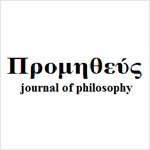BETWEEN INSTITUTIONAL LEGITIMATION OF THE CREED AND POPULAR SPONTANEITY OF RELIGIOUS LIFE: ON THE CENTRAL RELIGIOUS CHALLENGE TO THE 21ST CENTURY – A PHILOSOPHICAL APPROACH
v. 11, n. 28 • Prometeus: journal of philosophy
Autor: Leno Francisco Danner, Agemir Bavaresco, Fernando Danner
Resumo:
This article argues that the great normative challenge for institutionalized religions in the 21st century is the weakening of strong institutionalism and strong objectivity regarding the constitution, the legitimation and the social boosting of the creed. Indeed, by the affirmation of an essentialist and naturalized foundation, institutionalized religions establish and perform a kind of strong institutionalism which centralizes and monopolizes the interpretation and the social imposition of the religious creed on institutional dynamics, rules, procedures and self-authorized legal staff, in a way that consolidates a very pungent barrier and contraposition between institution and popular cultures, self-authorized scientific-theological-philosophical community and common people. Such a contraposition is resulted from strong institutionalism and defines a form of legitimation of creed that does not allow the moderation and even the abandonment of problematic parts of religious creed, as it does not enable its democratic renewal and reconstruction. Therefore, the 21st century’s very central institutional challenge is the institutional democratic openness to popular cultures and to common people in order to overcome strong institutionalism, which means also the weakening of essentialist and naturalized foundations as the basis of constitution, legitimation and social imposition of the creed.
Texto Completo: https://seer.ufs.br/index.php/prometeus/article/view/8351

Prometeus: journal of philosophy
O periódico PROMETEUS FILOSOFIA, vinculado ao Grupos de Pesquisa VIVA VOX e à CÁTEDRA UNESCO ARCHAI, hospedado na Plataforma de Periódicos Científicos da UFS, publica artigos inéditos na área de filosofia e afins, em língua portuguesa, espanhola, inglesa e francesa, bem como resenhas, notas de pesquisa e relatos de experiência que se enquadrem no nosso campo de publicação, isto é, pós-graduandos e pós-graduados em filosofia. O público-alvo é, fundamentalmente, o pós-graduado e o pós-graduando em filosofia.
